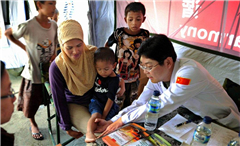State Council policies to improve people’s lives
2017-10-03
english.gov.cn
In the coming months, a number of policies issued by the State Council will become effective, bringing many aspects of convenience to the public.
Healthcare
Promote contract-based family doctor
The central government has detailed major tasks for healthcare reform in 2017 in a circular issued by the State Council on May 5.
According to the circular, China will expand its tiered medical system and contract-based family doctor services to 85 percent of prefecture-level cities. The contract rate for family doctors among key groups should reach above 60 percent in 2017, covering all impoverished populations.
Detail:>> China details major tasks in healthcare reform
Enhance supply of scarce drugs
By the end of 2017, an information collection and analysis mechanism for drugs in short supply should be set up, and the alert system should be improved, according to a circular issued in June.
A national platform to ensure the supply of drugs should be set up, based on big data.
Food
Enhance food safety and catering industry
China’s food safety watchdog and several other departments held a teleconference in September, which has launched a year-long campaign against frauds and false advertising in food and healthcare products.
The meeting required that food labels and instructions should be clear and accurate; the efficacy of healthcare products should have scientific bases; and words related to disease prevention and treatment are prohibited.
Also in September, the Food Safety Commission under the State Council and another 13 departments issued guiding opinions on improving the quality and safety of the catering industry.
The opinions require strengthening supervision of online catering services, including food safety of school canteens into the assessment of school safety, and reinforcing food safety of canteens of nursing homes.
Living
Tasks for shantytown renovation
The State Council executive meeting on May 24 urged ensuring implementation of support policies, strengthening local supervision, managing and utilizing special funds efficiently and speeding up infrastructure construction.
The government also decided to build 6 million new homes for shantytown redevelopment in 2017 and 15 million new homes for rundown urban areas across the country by implementing a three-year renovation plan from 2018 to 2020.
Detail:>> China to accelerate shantytown redevelopment
Urban-rural construction
The Ministry of Housing and Urban-Rural Development released a 13th Five-Year Plan for technology innovation of urban-rural construction.
The document urged enhancing the comprehensive disaster prevention ability of cities and accelerating the construction of technology support system for urban sewage collection and processing.
Promote garbage classification
The State Council issued a plan to promote garbage classification on March 30, setting a goal for the recycling rate in cities where household garbage is sorted to reach 35 percent by 2020.
The first batch of cities that are required to sort garbage by 2020 include Beijing, Shanghai, Tianjin, Chongqing and all capitals of provincial regions.
Detail:>> China to promote garbage classification
Boost home rental market in large, medium cities
China is pushing development of the home rental market in large and medium cities to address rising rental demand from urban newcomers.
Measures will be taken in cities with net population inflows, including increasing rental housing supplies and setting up a government-backed home rental service platform, according to a notice issued by the Ministry of Housing and Urban-Rural Development and other government departments.
Detail:>> China moves to boost home rental market in large, medium cities
Develop rural land for rental housing
China will allow the development of rental housing projects on rural land on a trial basis, authorities said on Aug 28.
Rural collective economic organizations can build and rent housing on rural construction land by themselves or through joint ventures, according to the Ministry of Land and Resources and the Ministry of Housing and Urban-Rural Development.
The program will be tested in 13 cities, including Beijing, Guangzhou and Shanghai, with many projects envisaged by the end of 2021, before expansion elsewhere.
Detail:>>China begins development of rural land for rental housing
Transportation
Regulate bike sharing services
The Chinese government issued guidelines on Aug 3 to regulate bike-sharing services, which have boomed nationwide but led to urban management challenges, such as congested city sidewalks.
Users of bike-sharing services in China should register under their real names, according to the guidelines released by the Ministry of Transport (MOT) and nine other government departments.
Detail:>>New guidelines to keep China’s bike sharing on track
Boost car-sharing services
China will support the country’s booming car-sharing industry and standardize its development, according to official guidelines released on Aug 8.
Unlike traditional car-rental services, car-sharing services take advantage of new technologies such as global-positioning and mobile internet.
Such services improve user experience and offer an alternative for urban commuting, easing growing demand for private cars and parking spaces, according to guidelines released jointly by the Ministry of Transport and the Ministry of Housing and Urban-Rural Development.


